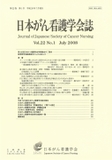Japanese
English
- 販売していません
- Abstract 文献概要
- 参考文献 Reference
要旨
本研究は,乳がんの術前化学療法を受ける患者の栄養状態の変化を明らかにすることを目的とした.2004〜2007年に初回術前化学療法を受けた乳がん患者50名を対象とし,診療記録の栄養指標となるデータについて統計的に分析した.全対象者の平均年齢は48.7(SD±9.0)歳で,DOC療法─FEC療法の順に治療を受けたレジメンⅠ群が31名(62%),FEC療法—DOC療法の順に治療を受けたレジメンⅡ群は19名(38%)であった.分析の結果,対象者全体で化学療法後のBMIは有意に増加していた.2元配置の分散分析では,体重,血清アルブミン,血清総蛋白では交互作用が認められ,レジメンによってこれらの変化のパターンが異なることが示された.レジメンⅠ,Ⅱ群いずれも前半化学療法後に,血清総蛋白と血清アルブミン値の有意な低下が認められたが,レジメンⅠ群では後半化学療法後にいずれも有意な増加があり,改善傾向がみられた.レジメンⅡ群では,後半化学療法後にも血清アルブミンと血清総蛋白の有意な低下と体重の有意な増加が認められており,浮腫や体液貯留による体重増加の可能性が考えられた.血清総コレステロールは,化学療法前後で両群とも有意な上昇が認められた.以上から,従来の症状と食事量の減少に対する指導のみならず,過剰な食事摂取の予防や,浮腫の助長を予防する食事や生活の注意を含めた指導の必要性が示唆された.
Abstract
The purpose of this study was to demonstrate changes in the nutritional status of patients receiving neoadjuvant chemotherapy for breast cancer. We analyzed data indicative of nutritional status in the medical records of 50 breast cancer patients who received initial neoadjuvant chemotherapy between 2004 and 2007. The mean age of all patients were 48.7(SD ± 9.0) years. Thirty one patients(62%)were allocated to Regimen I to start with docetaxel(DOC)followed by fluorouracil, epirubicin and cyclophosphamide(FEC). Nineteen patients(38%)were allocated to Regimen II starting with FEC first followed by DOC. Analysis showed that body mass index(BMI)was significantly increased after chemotherapy in all patients. Two-way analysis of variance showed that there were interactions among body weight, serum albumin and serum total protein, and that the pattern of changes in these parameters was different depending on the regimen. In both the Regimen I and Regimen II groups, significant reductions in serum total protein and serum albumin were observed after the first half of chemotherapy. However, in the Regimen I group, both parameters tended to improve, with a significant increase after the latter half of chemotherapy. In the Regimen II group, significant decreases in serum albumin and serum total protein, and a significant increase in body weight, were seen after the latter half of chemotherapy, so the weight increase might be caused by edema or fluid retention. Serum total cholesterol was significantly increased in both groups before and after chemotherapy. These findings suggested the need not only for guidance based on symptoms to date regarding reductions in the amount of food eaten, but also specific dietary and lifestyle advice about avoiding excessive food intake and preventing the development of edema.
Copyright © 2008, Japanese Society of Cancer Nursing All rights reserved.


